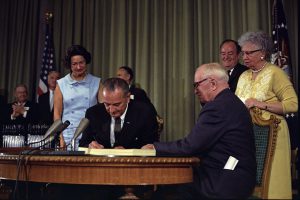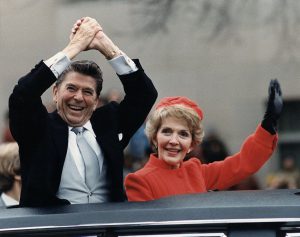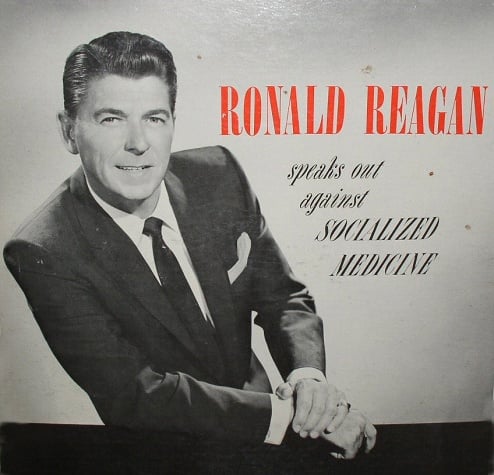They’d be hard to track down, but somewhere out in the United States right now are thousands of vinyl records documenting one of the most peculiar—and consequential—moments in the battle for American health care.
In 1961, Ronald Reagan, then a middle-aged film star who voted Democrat, recorded and released ’Ronald Reagan Speaks Out Against Socialized Medicine.’
Created in response to proposed Democratic healthcare reforms that would later become Medicare and Medicaid, the 10-minute LP was the first time the former Screen Actors Guild president had dipped a toe into a national political issue, publicly.
He came in hot too, using similar language to Republican detractors of health care reform before the passing of the Affordable Care Act (ACA) in 2010, and today.
[Socialized medicine] was a label, at the dawn of the Cold War, meant to suggest that anybody advocating universal access to health care must be a communist. And the phrase has retained its political power for six decades.
“[Reagan] no doubt terrified many of his listeners with his conclusion, telling them that if they did not prevent the passage of Medicare, ‘one of these days, you and I are going to spend our sunset years telling our children and our children’s children what it once was like in American when men were free,” author Max Skidmore wrote, of the spoken word record.
Part of an American Medical Association (AMA) campaign opposing government-paid health insurance for the elderly, the recording marked the genesis of a political journey that would eventually see Reagan go from has-been actor to the California governorship, and into the Oval Office.
Though he died in 2004, Reagan still enjoys an unshakable legacy as a conservative icon, who had a sweeping impact on the very subject he sat in a studio and spoke about nearly 60 years ago.
In the early 1980s, Reagan’s first term saw extensive cuts to Medicaid, the Department of Health and Human Services (HHS), and federal funding for maternal and child health.
Amongst a host of other negative public health effects, the uninsured numbers rose to a point in 1985, when 15 percent of Americans had no health insurance.
“History has taught us that such cuts to health and social service programs can have pervasive negative effects on health,” Dr. David R. Williams, a professor of public health at Harvard University, told Timeline, in 2017.
“Negative effects were soon evident in the health of pregnant women, children, and adults with chronic disease. There was an increase in women receiving no prenatal care.
“The overall decline in infant mortality slowed, and an increase in infant mortality in poor areas of 20 states was evident between 1981 and 1982. There was also an increase in preventable childhood diseases in poor populations.”
The road to ‘Operation Coffee Cup’
Though universal health coverage was favored by both Theodore Roosevelt and Franklin D. Roosevelt, the modern debate surrounding public and private health care in America has its roots in the 1940s.
President Harry S. Truman’s attempts to create a national health insurance system were stymied by the insurance industry and other conservative interest groups, while the AMA described potential reforms as ‘socialized medicine’ akin to ‘medical Soviets.’
“It was a label,” author T.R. Reid wrote of the term ‘socialized medicine’ in his 2009 book ‘The Healing of America’, “at the dawn of the Cold War, meant to suggest that anybody advocating universal access to health care must be a communist. And the phrase has retained its political power for six decades.”

By 1964, it is understood just one in four elderly Americans had “adequate hospital insurance protection.”
Though supporters of the Kerr-Mills Act, which instituted a largely unsuccessful, means-tested version of Medicare, the AMA was opposed to the reform plans of Kennedy, who ‘repeatedly attacked’ the 1960 bill.
That resistance blossomed into ‘Operation Coffee Cup,’ in the early 1960s. According to the U.S. Social Security Administration’s own history, the AMA began ‘Operation Coffee Cup’, against “the most deadly challenge ever faced by the medical profession.”
Millions of pamphlets were mailed, and handed out. Radio and television spots were booked, while a rotation of speech-makers encouraged conservatives to write letters to congressional representatives, discouraging their vote on what would later be Medicare.
The ladies were instructed to ‘put on the coffee pot,’ play the record for their friends and fellow physicians’ wives, and then get out the stationary … so that each of them could write personalized letters to their senators and congressmen.
After recruiting Reagan, the AMA sent his record out to their ‘ladies’ auxiliary’ organizations across U.S., according to the Huffington Post.
“The ladies were instructed to ‘put on the coffee pot,’ play the record for their friends and fellow physicians’ wives, and then get out the stationary … so that each of them could write personalized letters to their senators and congressmen,” the 2007 story detailed.
With the passing of Medicare and Medicaid under President Lyndon B. Johnson in 1965, the goals of ‘Operation Coffee Cup’ were ultimately unsuccessful. Reagan’s commitment to the cause would soon have consequential ramifications, though.
Reagan’s health care funding cuts
During his first term in the White House, Reagan, who became a Republican in 1962, cut Medicaid funding by more than 18 percent, while the Department of Health and Human Services budget was reduced by a quarter.
Government funding for maternal and child health was slashed by 18 percent, and dozens of other public health programs were impacted.
In an extensive 2017 essay for Timeline, Livie Campbell examined the downstream effects of Reagan’s health care cuts. They were legion.
Amongst other impacts, 600,000 lost Medicaid and a million children lost subsidized lunches, causing rises in poverty rates. Of the 603 hospitals that closed between 1980 and 1991, 309 were rural. Meanwhile, unintended pregnancy rates increased by nearly eight percent by 1987.
By the late 1980s, the life expectancy of Black Americans had decreased, while, in 1988, a third of all native Americans were dying by the age of 45. In addition, a 1988 report ‘recognized the need to improve public health surveillance and response’ when it came to pandemic planning and preparation.

Reagan’s opposition to ‘socialized healthcare’ still echoes today.
In February, the Trump administration proposed around $844 billion worth of budget cuts in health care. Though he is yet to propose a viable alternative to the ACA, the incumbent president has continually sought to dismantle Obamacare, even as the COVID-19 pandemic rips through the U.S.
Early last year, 13.7 percent of all Americans were without health insurance, following four straight years of increases. In December 2017, a Republican tax bill eliminated the ACA’s individual mandate, helping nudge uninsured numbers further upward.
As in the 1980s, hospitals, especially in rural areas, are closing at a rapid clip, while the federal response to COVID-19 has been hindered by the current White House ignoring ‘pandemic playbooks’ left in place by both the previous administrations.
For the past 35 years, the U.S. has fallen further behind in health. This coincides with the Reagan policies of greater disinvestment in public good.
“For the past 35 years, the U.S. has fallen further behind in health,” Dr. Sandro Galea, dean of public health at Boston University, told Timeline, in 2017.
“This coincides with the Reagan policies of greater disinvestment in public good. We are now continuing along these lines – that’s what worries me.”
Although in a completely different sense, that was the same emotion Reagan himself was attempting to impart on listeners, six decades ago.
While ‘Operation Coffee Cup’ may have failed at its initial task, the future President proved an age-old Newtonian truth – that every action has an equal and opposite reaction.
In the 1980s and beyond, the benefits of his, in health care, remain open for debate.



